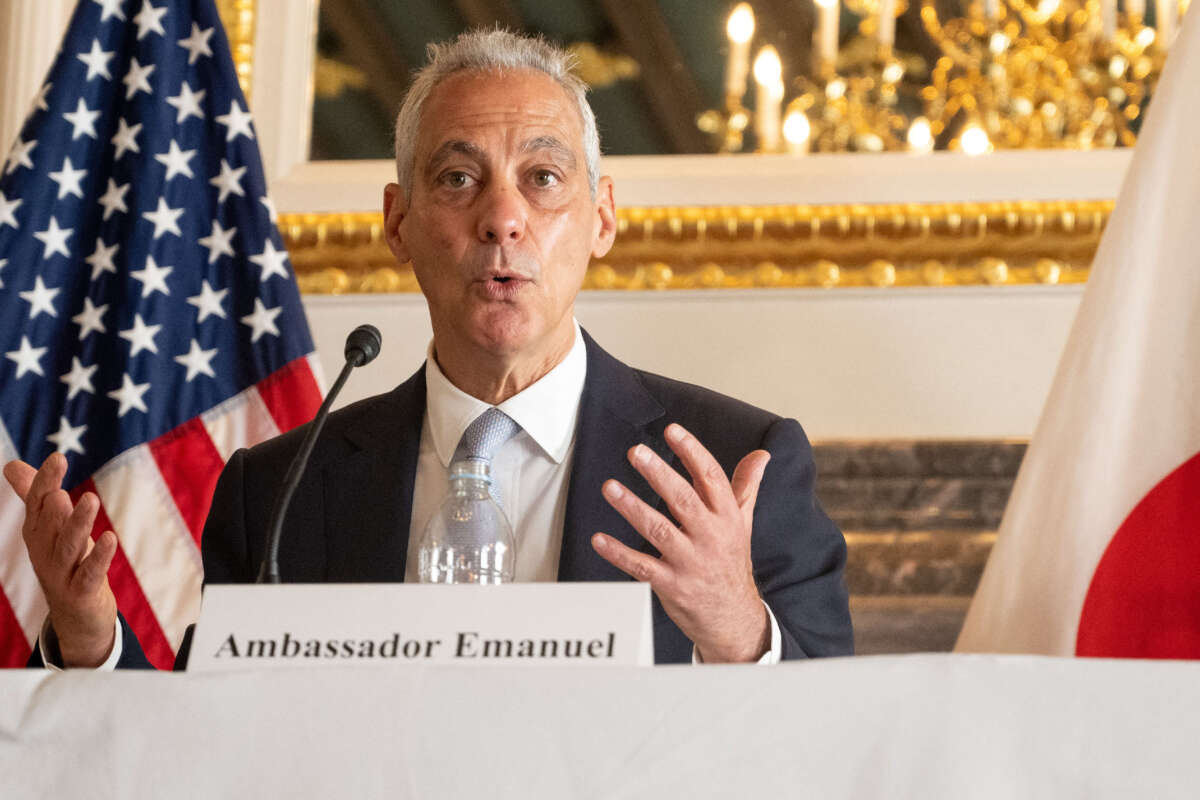Support justice-driven, accurate and transparent news — make a quick donation to Truthout today!
Representatives of hibakusha — the Japanese community of survivors of the United States’ bombings of Hiroshima and Nagasaki in 1945 — are denouncing an agreement between the U.S. and Japan that equates the indiscriminate killing of hundreds of thousands of civilians with at a World War II attack on a key U.S. naval base.
The Biden administration last week signed an agreement with Hiroshima Mayor Kazumi Matsui establishing a “sister-park” relationship between the Japanese city’s Peace Memorial Park and the Pearl Harbor National Memorial.
At a signing ceremony at the U.S. Embassy in Tokyo, U.S. Ambassador to Japan Rahm Emanuel appeared to equate the events that the two parks memorialize.
“Nobody can go to Pearl Harbor, and nobody can go to the Hiroshima Peace Memorial and enter the front door, walk out the exit door and be the same person,” Emanuel said.
Japan’s surprise attack on Naval Station Pearl Harbor in Hawaii in 1941 killed roughly 2,300 U.S. military personnel.
The Truman administration’s decision to drop an atomic bomb on Hiroshima in August 1945 immediately killed roughly 80,000 civilians, and a second bombing of Nagasaki killed about 70,000. Another 140,000 people died by the end of that year from the effects of the bombing.
The city of Hiroshima estimated that a total of 237,000 people were killed from radiation poisoning, cancer, and injuries in the five years after the attack.
Atsuko Yamamoto, a Japanese educator in Osaka, said the two attacks were “completely different” considering the scale and targets.
The attack on Pearl Harbor and the nuke bombing of Hiroshima are completely different.
— Atsuko Yamamoto🇯🇵 (@piyococcochan2) June 30, 2023
Pearl Harbor was an attack on U.S. troops, while Hiroshima was an attack on unarmed civilians.
Don't talk about them as if those events are the same.
The nuke attack on Hiroshima and Nagasaki… https://t.co/MHT7TC0IT3
Several survivors wrote to Matsui ahead of the ceremony to question to purpose of the sister-park agreement, arguing that the two attacks “are historic lessons to learn from and to never repeat” but not “something that we should forgive each other for.”
“The historical backgrounds of the two parks will forever be different,” Haruko Moritaki, an A-bomb survivor and peace activist who advises the Hiroshima Association for the Abolition of Nuclear Weapons, told the Chugoku Shimbun newspaper.
In response to the pushback, Emanuel said people in Japan should not be “trapped” by the emotions of “anguish and angst” associated with the devastating bombings that took place nearly 80 years ago, and that the agreement between the U.S. and Japan “is the example of what I think this world desperately needs right now.”
Kunihiko Sakuma, who chairs the Hiroshima Prefectural Confederation of A-Bomb Sufferers Organization, said reconciliation cannot truly be reached between the two countries until the U.S. acknowledges that “The A-bomb did not end the war and save the lives of American soldiers as the U.S. side likes to say.”
“It was clear that Japan was going to lose,” he told Nikkei Asia, saying the attack was unnecessary and meant as a display of U.S. military power.
“Unless that fundamental issue is addressed, we cannot just focus on the future,” said Sakuma.
Media that fights fascism
Truthout is funded almost entirely by readers — that’s why we can speak truth to power and cut against the mainstream narrative. But independent journalists at Truthout face mounting political repression under Trump.
We rely on your support to survive McCarthyist censorship. Please make a tax-deductible one-time or monthly donation.
